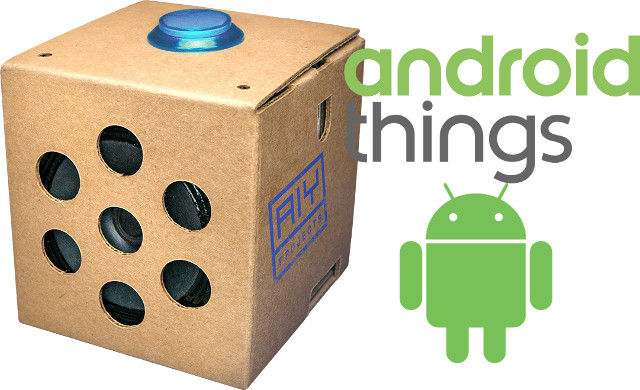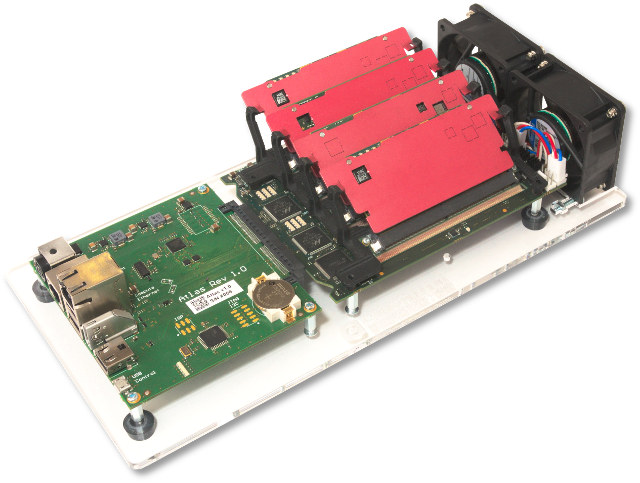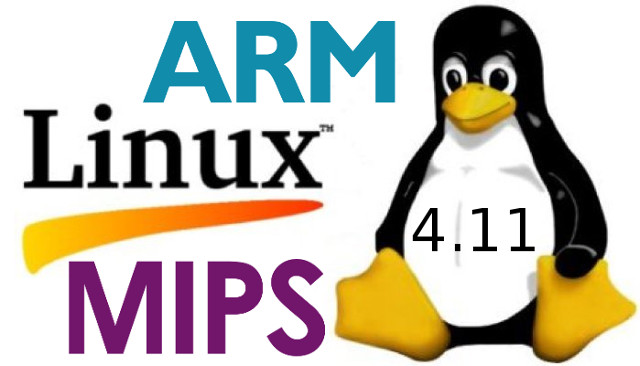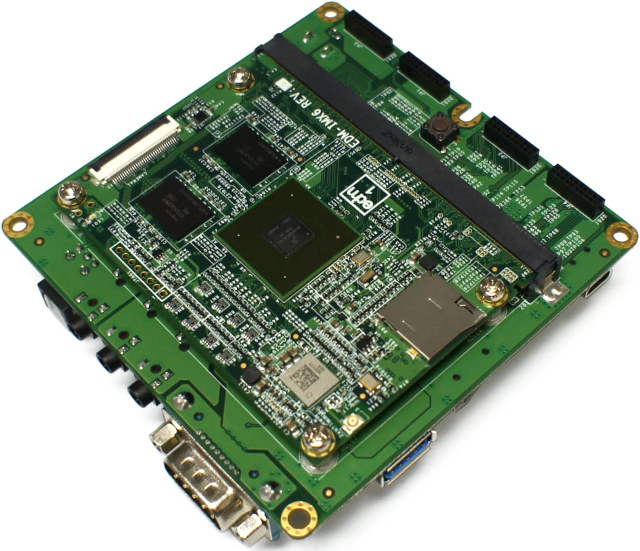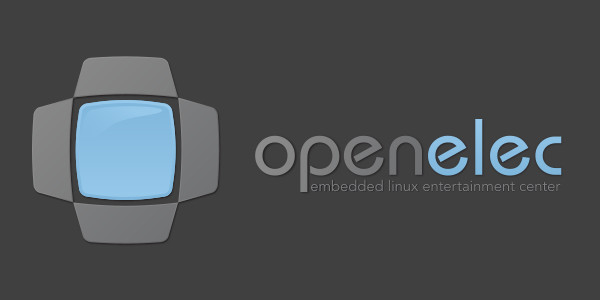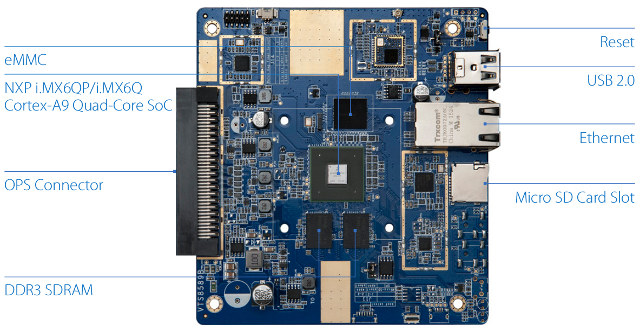Earlier this month, Google released a preview of the Google Assistant SDK that works on boards running Debian like the Raspberry Pi 3, and even launched AIY Project Voice Kit for the later. You can now play with Google Assistant on Android Things as the company has just released Android Things Developer Preview 4 with support for Google Assistant SDK. The operating systems works on any Android Things certified devices, but the example instructions for Google Assistant API on Android Things also include steps to use Raspberry Pi 3 board together with AIY Projects Voice kit. The developer preview 4 also adds I2S to the peripheral I/O API and is demonstrated in the aforementioned example, and new hardware support with NXP i.MX7D based Pico Board equipped WiFi & Bluetooth, Ethernet, USB ports, an audio jack, and an I/O expansion port. Android Things DP4 also brings the ability for developers to […]
Christmann RECS|Box Atlas Quad Apalis Microserver Evaluation Kit Supports Four Toradex Apalis SoM
System-on-modules are normally used in low volume embedded systems, but they can also be used in microservers, for example to upgrade capacity as needed. Christmann informationstechnik + medien GmbH has developed a microserver evaluation kit taking up to 4 Toradex Apalis SoMs for example based on Nvidia Tegra K1 processor, and also offers full rack systems with up to 72 modules. Christmann RECS|Box Atlas Quad Apalis specifications: Modules – 4x Slots for Apalis SoM Connectivity – 1 GBit/s Compute Ethernet, 1 GBit/s Management Ethernet Video Output – 1x HDMI USB – 3x USB host ports, 1x micro USB port Misc – 5 Status LEDs for USB, communication, and serial console, 4x fan connectors, KWM switch, 5x temperature sensors, 6x current sensors, 1x voltage monitor, fan speed monitoring Power Supply – 12V via a 4-pin jack Dimensions – 300 x 145 x 68 mm The evaluation kit includes an Atlas board […]
Does That Crane or Drilling Rig Run mainline Linux?
Linux 4.11 has just been released, and as usual I looked into the changelog especially checking out work done on ARM architecture, and some newly supported SoCs or board. One line in the log caught my attention: “Liebherr (LWN) monitor 6 based on i.MX6 Quad, no idea what this is”. So I had a look, and Liebherr-Werk Nenzing GmbH is a swiss company specializing in construction machines and maritime cranes such as “crawler cranes, duty-cycle crawler cranes, as well as piling and drilling rigs”. The DTS file for LWN Monitor 6 shows an NXP i.MX 6Quad processor is used in a product with an LVDS display and various interfaces such as I2C, PWM, SPI, and so on. So it could be some kind of control panel for one or more of their equipment. After looking into some PDF documentation, we can see on page 10 that the company mentions Litronic […]
Linux 4.11 Release – Main Changes, ARM & MIPS Architecture
Linus Torvalds has just released Linux 4.11: So after that extra week with an rc8, things were pretty calm, and I’m much happier releasing a final 4.11 now. We still had various smaller fixes the last week, but nothing that made me go “hmm..”. Shortlog appended for people who want to peruse the details, but it’s a mix all over, with about half being drivers (networking dominates, but some sound fixlets too), with the rest being some arch updates, generic networking, and filesystem (nfs[d]) fixes. But it’s all really small, which is what I like to see the last week of the release cycle. And with this, the merge window is obviously open. I already have two pull request for 4.12 in my inbox, I expect that overnight I’ll get a lot more. Linux 4.10 added Virtual GPU support, perf c2c’ tool, improved writeback management, a faster initial WiFi connection […]
Wandboard QuadPLUS Development Board Gets i.MX 6QuadPlus Processor, 802.11ac WiFi and Bluetooth 4.1
The first Wandboard development boards launched in 2012 nearly 5 years ago based on Freescale i.MX6 Solo and Dual processor, with Wandboard Quad launched a few months later. The boards were fairly popular at the time due to their better specifications, and especially Freescale’s much better documentation and software compared to the competition such as Broadcom (Raspberry Pi) and Allwinner (Cubieboard). Since the boards are based on TechNexion EDM system-on-modules they could also be used by companies working on their own products based on the system-on-module. It’s also a good platform if you want to test various version of Android, because the company released Jelly Bean, Kitkat, Lollipop, and Marshmallow images for the boards, and I’m expecting a Lollipop version soon. However, albeit the company worked on other NXP boards such as PICO-IM6UL Android Things, there had not been any hardware upgrade for Wandboard for nearly 4 years, but last […]
MYIR MYS-6ULX is a $25 Single Board Computer based on NXP i.MX 6ULL/6UL Processor for IoT and Industry 4.0
MYIR Tech has released MYS-6ULX single board computer based on NXP i.MX 6ULL/6UL Cortex-A7 processor designed for either Industry 4.0 with MYS-6ULX-IND model, or the Internet of Things for MYS-6ULX-IOT. Both boards include 256MB DDR3 SDRAM, 256MB NAND flash, USB, USB, Ethernet, LCD interfaces and more, in a compact 70 x 55mm form factor. Both boards have very similar specifications. Features MYS-6ULX-IND MYS-6ULX-IOT SoC NXP i.MX 6UltraLite (MCIMX6G2CVM05AA) with an ARM Cortex A7 processor @ up to 696 MHz and 2D graphics accelerator NXP i.MX 6ULL (MCIMX6Y2DVM05AA) with an ARM Cortex A7 processor @ 528 MHz and 2D graphics accelerator DDR3 256MB (support up to 2GB) NAND Flash 256MB (support 512MB/1GB) eMMC DNP (Do Not Populate – Reserved design for optional 4GB flash) Ethernet 10/100Mbps USB 1x USB Host, 1x micro USB OTG Micro SD Card 1x Micro SD card slot Buttons 1x Reset Button, 1x User Button LED 1x Power Indicator, 2x […]
OpenELEC 8.0 Released with WeTek Play 2 & Hub, and Raspberry Pi Zero W Support
In recent months, I’ve written more about LibreELEC, a fork of OpenELEC, but the latter project is still being worked on, and OpenELEC 8.0 has been released adding builds for WeTek Play 2 & WeTek Hub TV boxes, as well as Raspberry Pi Zero W board, and upgrading to Kodi 17.1. and newer packages such as Linux 4.9 and ffmpeg 3.2. The developers also removed some unused or dropped features such as HFS and HFS+ filesystem, iSCSI, NFS/NBD/iSCSI network boot, and LIRC. X11 AMDGPU, ATI (Radeon) and Intel GPU driver driver has been replaced by X11 Modesettings GPU driver. They also updated some drivers & firmware files for WLAN and DVB, as well as update Nvidia Legacy driver to xf86-video-nvidia-340 (VDPAU only supported now). You can download or update OpenELEC 8.0, not only for the new WeTek and Raspberry Pi platforms, but for also x86 64-bit images for Intel & […]
VIA VTS-8589 OPS Board Powered by NXP i.MX 6 ARM Processor Complies with Intel’s OPS Digital Signage Specifications
Intel introduced the Open Pluggable Specifications (OPS) defining mechanical and electrical requirements for boards used in digital signage back in 2010. Since then there has been a few Intel OPS boards launched on the market, and the company introduced OPS+ specifications with support for simultaneous display and broadcast usages, 8K resolution displays, and the ability to drive three individual 4K resolution display outputs. VIA has now launched VTS-8589 OPS board compliant with the older specifications, and featuring NXP i.MX6 quad core ARM Cortex A9 processor combined with 2GB RAM, 8GB flash, and more. VIA VTS-8589 OPS has two version of the board with the following specifications: SoC VTS-8589-QP model – NXP i.MX 6QuadPlus quad ARM Cortex-A9 processor @ 1.0 GHz with Vivante GC2000+ GPU supporting OpenGL ES 3.0, OpenCL and OpenVG 1.1, 512KB embedded SRAM VTS-8589 model – NXP i.MX 6Quad quad ARM Cortex-A9 processor @ 1.0 GHz with Vivante GC2000 […]


